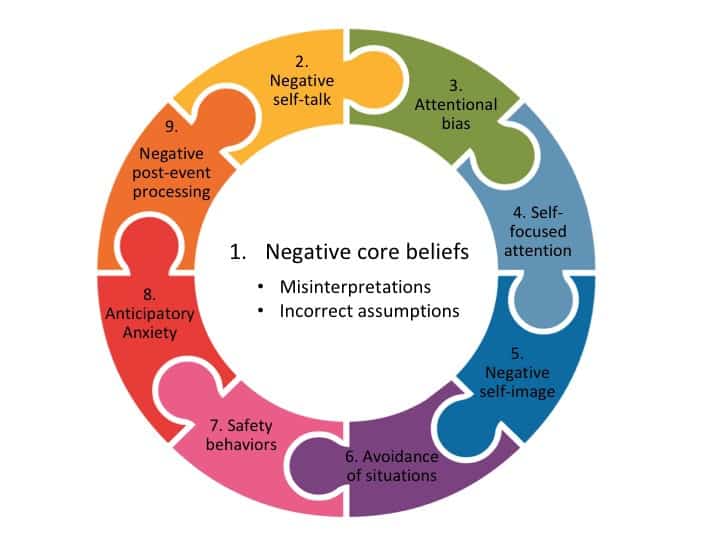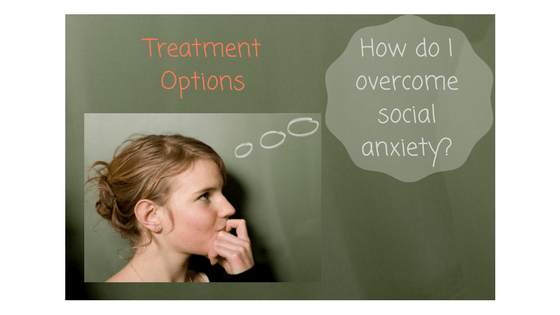→ Previous: How can I desensitize?
→ Next: Medications vs. CBT
Anxiety management techniques vs. a treatment program
If you have social anxiety, you've probably heard people say "do deep breathing" or do progressive muscle relaxation. These are helpful anxiety management techniques, but they are not a comprehensive treatment program. To overcome social anxiety, you need more than individual anxiety management techniques—you need a comprehensive treatment program. A comprehensive treatment program includes desensitization training, developing new thought patterns and perspectives, and anxiety management techniques (including deep breathing, meditation, and many others). It may also include medications.
Most people when they're feeling horrible or have the flu don't hesitate to go to a medical doctor, and in the same way, we should not hesitate to get treatment for social anxiety. Social anxiety can be much more debilitating than the flu and can last our entire lives if we don't do something to address it. Social anxiety can affect how much money we earn, how happy we are in our jobs, how connected we are to other people, how likely we will reach our dreams and our goals, and affects our entire quality of life. There are no treatments for social anxiety that have 100% success rate for every person, but cognitive-behavioral treatments (which can be combined with medication), have been shown to have the best success rates.
A comprehensive treatment program includes information and exercises that address each of the items below:
Sample treatment model
This is an example of a treatment model used for social anxiety. Most cognitive-behavioral treatment centers will use this or a similar model. Treatment programs typically include "lectures" and exercises that address each of the items below:

Social Anxiety Treatment Model
Painful self-awareness loop
With social anxiety you get caught in a loop that is difficult to stop without help from an experienced professional. Here's what's happening:
You're trying to impress --> which creates undue pressure --> which makes you self-aware and makes you self-monitor --> which takes your brain's attentional resources away from the situation at hand and focuses your attention on yourself --> which brings out your inner critic as you're assessing your performance and telling yourself that you're not doing a good enough job --> which creates more anxiety --> which creates embarrassment that you're not performing as well as you'd like (because your attentional resources are distracted) --> which creates more anxiety. It's a difficult loop to stop.
Treatment options
These are the "gold standard" cognitive-behavioral therapy (CBT) anxiety treatment centers. The treatment typically takes place in groups. It's healing to meet others who share your fear, and realize that they have similar symptoms and experiences. Groups provide a safe laboratory where you can desensitize. Groups also allow you to experiment with new behaviors and thinking patterns in a safe laboratory.
You can also work with a therapist one-on-one. If you're looking for a therapist who specializes in anxiety, here are the best websites to search for an anxiety specialist. In general, look for a cognitive-behavioral therapist (CBT) as this is the treatment shown to be most effective for social anxiety.
The Anxiety and Depression Association of America (ADAA) has a therapist directory and good resources for finding a therapist. Here are some links you can check out:
Here is an explanation of psychologists vs psychiatrists vs. other mental health professionals.
You can also check out my online program that includes a self-paced course, a desensitization laboratory and desensitization practice clubs for the anxious (think "pre-toastmasters"). Throughout the program, I work with you as your guide and coach to keep you on track towards your goals and guide you to desensitize successfully.
Benefits of a treatment program
One of the key benefits of a treatment program is accountability which significantly increases your chances for success. For example, the scrutiny exercises I recommended are great, but until you're in a treatment program, you may not do them. The chances of doing them increase significantly when you're enrolled in a program. Working with a therapist of coach in a program will help to keep you on track toward your goals.
The other benefits of a treatment program:
- You'll have an expert to talk to about your exact situation.
- Desensitization must be done correctly to be successful. There are many nuances and tricks you have to know to do it right - otherwise desensitization can back-fire.
- You'll have help identifying and targeting your specific thought patterns that increase your anxiety. And you'll have help writing a new self-talk script that is tailored to your specific situation.
Feel free to post questions or comments at the bottom of this page!
→ Previous: How can I desensitize?
→ Next: Medications vs. CBT
How to overcome social anxiety



